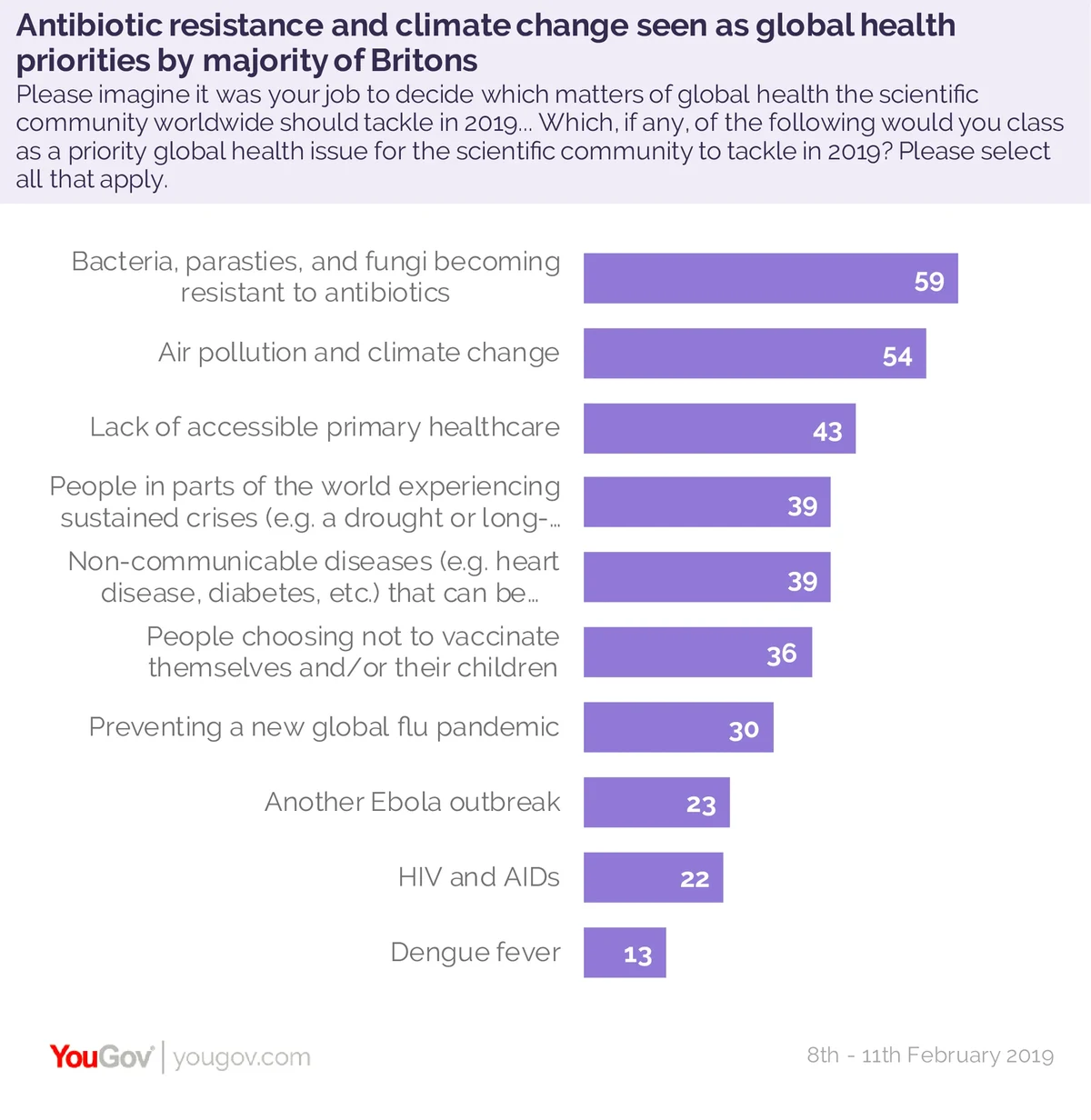The World Health Organisation has listed the ten biggest threats to global health today - but which ones keep Britons up at night?
At the beginning of the year the World Health Organisation (WHO) set out a five year plan to improve global health and published a list of the ten most dangerous issues demanding attention, including air pollution, ebola and the risk of a flu pandemic.
For the third episode of YouGov and Yahoo’s podcast, “Britain Is A Nation Of…”’, we explored to what extent the British public is on the same wavelength about which issues need to be tackled most urgently.
Antibiotic resistance seen as the most urgent issue for global health
Respondents were presented with the WHO’s list of global health issues and asked which they personally see as a priority which the scientific community should tackle urgently in 2019. They were not told that all items on the list had been classed as priority issues by the WHO.
The most frequently selected issue was bacteria, parasites and fungi becoming resistant to antibiotics, which could prevent us from being able to treat diseases such as pneumonia, gonorrhoea, or tuberculosis. Six in ten Britons (59%) classes this as a priority for global health.
The second most voted for issue by Britons was air pollution and climate change (54%), classed by the WHO has the greatest environmental risk to health today.

Dengue fever is the lowest priority global health issue for Britons
Not a single other issue on the list was seen as a priority by a majority of Britons.
Four in ten classed a lack of accessible primary healthcare (43%) as a priority, which the WHO says may have been neglected in recent years because of a focus on eradicating specific diseases. Non-communicable diseases like cancer or heart disease, which are responsible for 70% of deaths worldwide, are seen as a priority by the same proportion of Britons (39%).
Another four in ten (39%) think people experiencing sustained crises such as drought, famine, conflict or population displacement should be a global health priority. The WHO says one in five people around the world are currently living in an area experiencing sustained crisis.
A third see people choosing not to vaccinate themselves or their children (36%) as a priority issue. The WHO says vaccination prevents 2-3 million deaths a year and could prevent a further 1.5 million if vaccinations were more common.
Preventing a new global flu pandemic was next on the list, with 30% of Britons classing it as a priority. Health experts do not know when another flu pandemic will hit but are monitoring circulation of viruses constantly to detect pandemic strains.
Less than one in four think another Ebola outbreak (23%) or HIV and AIDS (22%) should be one of the priority health issues for the scientific community to tackle in 2019. Two separate Ebola outbreaks in the Congo last year spread to cities with over a million people. 37 million people worldwide are living with HIV, and nearly a million die every year from HIV/AIDs.
The issue seen as least urgent by Britons was dengue fever, classed as a priority by just one in eight respondents (13%). Dengue is a mosquito-borne disease common in the rainy season in countries like Bangladesh, India or Brazil. 40% of the world is at risk, and up to 20% of those who get the disease die from it.
The most urgent issues of all, according to Brits: antibiotic resistance and climate change
When asked to select the single most urgent issue for the scientific community to tackle in 2019, respondents were most likely to choose antibiotic resistance (25%), or air pollution and climate change (25%).
One in nine (11%) chose lack of accessible primary healthcare and one in twelve (8%) thought non-communicable diseases were the most urgent issue.
See the full results here
Photo: Getty









